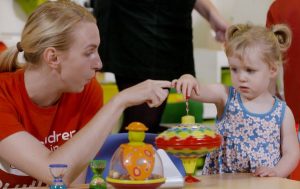Child Development
Whilst in hospital, it is important that a child receives the necessary support for their growth and development and although a lot of children develop similarly it is important to note that each child is unique and that no two children will develop in exactly the same way.
Volunteer facilitate Play for Play’s Sake, rather than with a developmental or medical goal, however, having an understanding of child development may spark new ideas and make facilitating play easier.
Some important aspects of growth and development are:
• Physical and sensory development (body growth and movement)
• Cognitive development (thinking and understanding language)
• Language development (speaking and understanding language)
• Emotional development (expressing and managing feelings)
• Social development (mixing and getting on with others)
All these aspects are all connected and influence each other. Under stress a child may lose some skills or regress in their ability or desire to do things. Stress can be physical or emotional.
Having an idea of what children are typically able to do and like doing at various stages in their development makes it easier for volunteers to play with them, to understand them and their needs and to have a reasonable expectation regarding behaviour.


The following are age-appropriate activities which will support children with their development whilst in a hospital environment:
BIRTH TO 2 YEARS
Babies love to hear voices talking and singing, and love to watch people. They absorb everything they hear and see. Here are some suggestions regarding activities and toys for this age category:
- Gross motor skills: Crib toys, a smooth clean surface for crawling, push-pull toys, soft toys and balls.
- Fine motor skills: Stacking cups, rattles, teething rings, blocks and activity boxes, musical toys, pots and pans.
- Social development: Human faces, smiles, mirrors, soft dolls; infants also love to hear the human voice.
- Artistic development: Visual displays and musical mobiles.
2–3 YEARS
The toddler enjoys frequent, short play periods, often playing alone as they have not yet grasped the art of sharing. Toddlers often attach themselves to a particular small toy for comfort. They love messy play – for example, sand, water and paint.
- Gross motor skills: Push-pull toys, ride-on toys, balls, dolls.
- Fine motor skills: Building blocks, peg puzzles, play dough, threading beads.
- Social skills: Dress-up costumes, toy telephones, dancing and singing, shared story time.
- Artistic skills: Large crayons, finger painting, hand prints




4–5 YEARS
Preschool children are very active and are learning about the world around them. They start to play with other children and like to play ‘make believe’.
- Gross motor skills: Slides, tricycles, ball pools, ball games.
- Fine motor skills: Threading beads, jigsaw puzzles, sewing cards.
- Social development: Board games, ‘I-spy’ game, doll’s house, role play.
- Artistic development: Paint, crayons, glue, scissors, fabric and paper pieces, peg boards colouring books.
6–8 YEARS
Six to eight year olds are interested in games and social play. They can organise their own playgroups and enjoy realistic play with rules. They have developed their fine motor skills and have mastered the art of handwriting.
- Gross motor skills: Bikes, scooters, football, handball.
- Fine motor skills: LEGO, carpentry sets, threading smaller beads, jigsaws, simple sewing.
- Social development: Board games, singing, and role play.
- Artistic development: Paints, pencils, scissors, markers, card-making templates, simple stitching, collage materials, colouring books.
9–12 YEARS
Children in this age group are becoming increasingly independent and self-sufficient. Adults are needed more to supervise than to organise their activities. Acceptance in peer groups becomes more important.
- Gross motor skills: Field sporting activities, table tennis, air hockey.
- Fine motor skills: Model making, building with LEGO, jigsaws, sewing, fine detailed art activities for example, the ability to use smaller paint brushes and to cut smaller shapes.
- Social development: Interactive board games, computer and media games, music and dancing.
- Artistic development: Origami (Japanese art of paper folding), a larger variety of art materials, adult colouring books.
13 YEARS AND OVER
This age group is focused on independence. Teenagers have a keen interest in games involving intellectual competition and enjoy challenging both their peers and adults.
- Gross motor skills: Team sports, ball games, cycling, skate boarding, basketball, gym activities and dancing.
- Fine motor skills: Sewing, drawing, woodwork, age-appropriate construction kits, puzzles.
- Social development: Music, board games, team sports, acting.
- Artistic development: All types of art and craft activities with a broad range of materials and tools


Supporting all children and young people through Art
- Art is a creative form of expression.
- Children learn through exploration and discovery, which in turn fosters confidence, independence, self-esteem, social skills and communication.
- Art, no matter how simple the task, should be not be finished or ‘tidied up’ by the adult.
- The role of a volunteer is to facilitate children’s activities, and allow them the freedom to make choices.
- An adult can assist but if it becomes apparent that it is the adult and not the child who is making or doing most of the activity, then the adult needs to consider: ‘Is this activity age-appropriate?’; ‘Is the child interested in this activity?’; ‘How can I engage the child more in this activity?
- Invite the child to talk about the activity in which they are engaged by using open-ended questions and comments – for example, by saying: ‘Tell me about your picture’, rather than asking, ‘Is that a dog you drew?’ Sometimes a child’s drawing of a dog is clearly obvious to them but not always to the adult.
For additional ideas and supports click here for The Playful Project Manual
